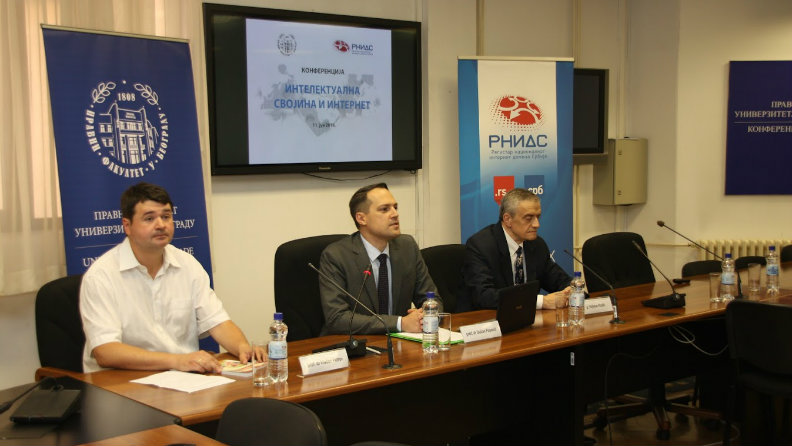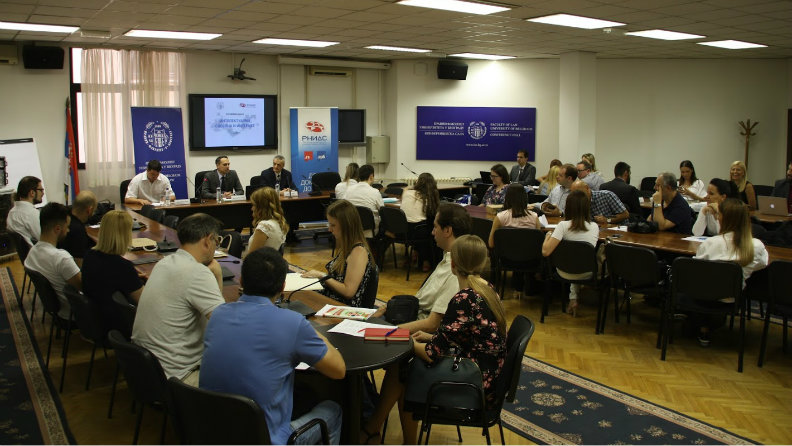
The Belgrade Faculty of Law and the Serbian National Internet Domain Registry Foundation (RNIDS) organised the fourth Intellectual Property and the Internet conference on 11th June 2018. This year the discussion was of numerous current topics concerning copyright, domain names, online content and new technologies.
“We have all become Internet addicts, and we are becoming increasingly careless in the way we use it. That is why the protection of subjective rights relating to the use of intellectual assets on the Internet is an area deserving of special attention,” said acting Dean of the Faculty of Law Prof Dr Vladan Petrov.
Chair of the RNIDS Board Vojislav Rodić noted that 2018 was a very significant year for RNIDS. “We are marking ten years since the launch of the .rs domain, and not long ago the one-hundred-thousandth .rs domain was registered. This is a reminder to us of how much of our activity is conducted on the Internet, and raises the need for new rules to protect us in our virtual interactions.”
Domain names are of great importance in today’s business world, but in practice they have often become the subject of dispute. Full professor of the Faculty of Law and chair of the Committee for the resolution of disputes relating to the registration of national internet domain names Prof Dr Dušan Popović, talked about the new Uniform Rapid Suspension system - URS, which was established by the Internet Corporation for Assigned Names and Numbers (ICANN) in order to quickly resolve domain registration disputes.
“Trademark owners have not embraced the new URS dispute resolution approach to any great extent and are still opting for the old system in significantly larger numbers. URS is supposed to expedite the process, but also raises numerous issues which have still not been resolved in practice,” Popović explained. “The procedure to resolve these disputes would be significantly faster and cheaper with the use of artificial intelligence and other specialised software,” explained assistant professor of the Faculty of Law and vice-president of the Committee for the resolution of disputes relating to the registration of national internet domain names, Dr Marko Jovanović, presenting his work.

Teaching associate at the University of Belgrade Faculty of Law, Novak Vujičić has analysed the increasingly common practice in the courts of EU member states of ordering Internet operators to block certain sites due to copyright infringements. He said that enforcing measures to prevent access to websites could prove an excessive burden to Internet operators, both in financial and in organisational terms, if the number of court rulings ordering such blocking measures was to increase significantly in the near future.
There was also a review of the possibilities for the use of blockchain technology in copyright management. “Blockchain could be used to record every instance of the use of a copyrighted work and after that to simplify payment of royalties from users to authors,” said lawyer Dragan Milić, adding that this would reduce the number of copyright infringements. The increasing use of this technology was also illustrated by the news that the first auction via blockchain of a painting, by Andy Warhol, would soon be conducted.
Attorney and partner at OAD Moravčević, Vojnović and Partners Dr Andrea Radonjanin talked about the increasing online trade in counterfeit goods. “Illegal traders advertise and offer goods online, and since they have no import costs or any other of the expenses normally associated with doing business, they sell the goods below market price. It is very difficult to monitor and combat this kind of illicit trade,” said Radonjanin. She added that getting inspectors on board and increasing the involvement of state authorities was key to this process.
At the event there was also talk of digitisation of cultural heritage, and especially of the copyright problems surrounding the digitisation of so-called orphan works, i.e. works for which the author is unknown or uncontactable. The need was emphasised for the Serbian Copyright Law to be harmonised in this regard with the EU Directive on orphan works. The papers presented at the conference have been published in a journal by the Faculty of Law.